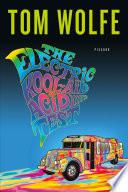On Kesey's coining of the phrase "on the bus", in The Electric Kool-Aid Acid Test (1968), Ch. VI : The Bus; as Paul Grushkin reports, in Dead Letters: The Very Best Grateful Dead Fan Mail (2011), p. 120, the statement became a famous evocation of an attitude:
The phrase became a metaphor for 1960s culture rethinking — if you were "on the bus" you were "with it."
The Electric Kool-Aid Acid Test (1968)
Quotes from book
The Electric Kool-Aid Acid Test

The Electric Kool-Aid Acid Test is a nonfiction book by Tom Wolfe that was published in 1968. The book is remembered today as an early – and arguably the most popular – example of the growing literary style called New Journalism. Wolfe presents an as-if-firsthand account of the experiences of Ken Kesey and his band of Merry Pranksters, who traveled across the country in a colorfully painted school bus, the destination of which was always Furthur, as indicated on its sign, but also exemplified by the general ethos of the Pranksters themselves. Kesey and the Pranksters became famous for their use of LSD and other psychedelic drugs in hopes of achieving intersubjectivity. The book chronicles the Acid Tests , the group's encounters with famous figures of the time, including famous authors, Hells Angels, and The Grateful Dead, and it also describes Kesey's exile to Mexico and his arrests.
“I'd rather be a lightning rod than a seismograph”
On Ken Kesey, in Ch. I : Black Shiny FBI Shoes
The Electric Kool-Aid Acid Test (1968)
Context: He talks in a soft voice with a country accent, almost a pure country accent, only crackling and rasping and cheese-grated over the two-foot hookup, talking about —
"—there's been no creativity," he is saying, "and I think my value has been to help create the next step. I don't think there will be any movement off the drug scene until there is something else to move to —"
— all in a plain country accent about something — well, to be frank, I didn't know what in the hell it was all about. Sometimes he spoke cryptically, in aphorisms. I told him I had heard he didn't intend to do any more writing. Why? I said.
"I'd rather be a lightning rod than a seismograph," he said.
He talked about something called the Acid Test and forms of expression in which there would be no separation between himself and the audience. It would be all one experience, with all the senses opened wide, words, music, lights, sounds, touch —
lightning.
On Ken Kesey, in Ch. I : Black Shiny FBI Shoes
The Electric Kool-Aid Acid Test (1968)
Context: He talks in a soft voice with a country accent, almost a pure country accent, only crackling and rasping and cheese-grated over the two-foot hookup, talking about —
"—there's been no creativity," he is saying, "and I think my value has been to help create the next step. I don't think there will be any movement off the drug scene until there is something else to move to —"
— all in a plain country accent about something — well, to be frank, I didn't know what in the hell it was all about. Sometimes he spoke cryptically, in aphorisms. I told him I had heard he didn't intend to do any more writing. Why? I said.
"I'd rather be a lightning rod than a seismograph," he said.
He talked about something called the Acid Test and forms of expression in which there would be no separation between himself and the audience. It would be all one experience, with all the senses opened wide, words, music, lights, sounds, touch —
lightning.